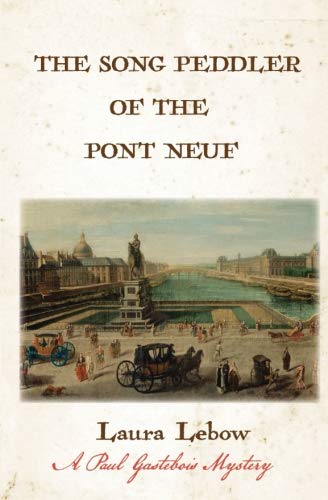The Song Peddler of the Pont Neuf
Paul Gastebois, a “confidential inquirer” in Paris of 1788, usually avoids taking on missing person cases. “People in Paris are lost all the time, sometimes on purpose,” he says. Still, he can’t resist the challenge of finding Gaspard Bricon, an elderly man who spent his days singing and selling copies of his songs on the Pont Neuf, the city’s oldest bridge. One of Gaspard’s good friends is worried, and Paul feels touched by his concern. Besides, Paul’s well-paying gig of tailing a rich young Austrian diplomat around Paris for the police is pretty dull, and this new case fires up his curiosity. His search takes him to Gaspard’s lodgings, where a piece of crumpled parchment leads him to assume the song peddler was involved in high-level political blackmail.
The author’s skillful plotting keeps readers guessing as the mystery expands and transforms during Paul’s investigations through many Parisian neighborhoods. Our detective’s background is equally interesting; his younger sister Aimée is an apprentice seamstress, his brother is a churchman, and Paul had evaded his late father’s plans for him to join the butcher’s trade, preferring a career independent of the guilds (and smelly animal carcasses).
Lebow sets her series opener not in the popular French Revolutionary era but the less familiar time beforehand, and she incorporates the details to good effect. Louis XVI has agreed to convene the Estates General for the first time in over 170 years, and the commoners—who have grown more numerous and prosperous—place their hopes in finance minister Jacques Necker for fair representation and tax reform. Despite some people’s guarded optimism, there’s a fierce underground trade in scurrilous pamphlets, and Paul gets enmeshed in learning more about that risky business, too. Multifaceted characters, abundant local color, and dashes of wit (one of Paul’s disguises is laugh-out-loud funny) add to the appeal of this diverting mystery.










